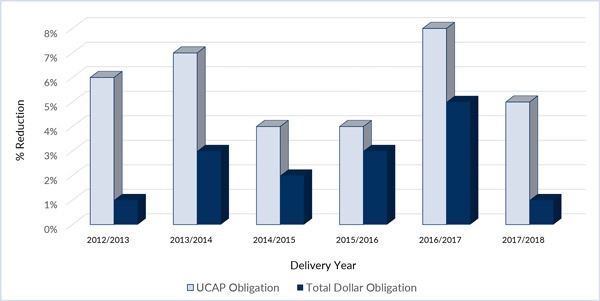By Rory D. Sweeney
VALLEY FORGE, Pa. — PJM’s Markets and Reliability Committee on Thursday rejected two proposals members said threatened the Capacity Performance construct, but it approved two others that would investigate potential changes in the rules.
A proposal to change rules on penalties for underperformance failed in a sector-weighted vote with 47.6% support, well below the two-thirds threshold. Nearly three-quarters of the Generation Owners sector supported the proposal, but other sectors were split or strongly opposed.
The proposal would have changed the nonperformance assessment charge rate and ownership requirements for making retroactive replacement transactions. It also would have introduced a way to offset underperformance with overperformance and a new monthly stop-loss provision while changing the annual stop-loss rule.
Reduced Incentives
Opponents said the changes reduced incentives for generators to meet their commitments.
“Every one of these proposals is designed to undermine those incentives,” said Howard Haas of Monitoring Analytics, PJM’s Independent Market Monitor.
PJM’s Stu Bresler also voiced concerns with the proposal and said the RTO couldn’t support it.
A proposal to extend Base Capacity another year through the 2020/21 Base Residual Auction in May fared better but also fell short in a sector-weighted vote, receiving 58.6% in favor.
Direct Energy’s Jeff Whitehead presented the proposal as a stop-gap to allow seasonal resources to continue participating in the market pending a FERC ruling on PJM’s plan to make it easier for them to qualify as CP.
The proposal had near-unanimous support from the Electric Distributor and End Use Customer sectors but was opposed by most Generation Owners and Transmission Owners.
PJM Filing
PJM filed its plan with FERC on Wednesday, requesting a Jan. 19 implementation date to ensure the new rules are in effect for the BRA on May 10 (ER17-367). It would make it easier for summer- and winter-only resources to aggregate for the year-round deliverability required under CP. (See No End in Sight for PJM Capacity Market Changes.)
Stakeholders said extending Base Capacity would impede the full implementation of CP. Both PJM and the Monitor rejected Whitehead’s proposal, but they said they were open to further discussion on how to incorporate seasonal resources.
Brock Ondayko of American Electric Power said those who supported the Base Capacity proposal but not the proposal to relax underperformance penalties were being “disingenuous” and called the extension “poor irony” because it creates competition to CP offers.
“There’s no such thing as Base Capacity in the year 2021, so this is essentially a new product that will take away from the existing products,” he said.
Exelon’s Jason Barker opposed the proposal, saying his company is “eager” to see if CP reforms are effective.
Talking Past Each Other
Dan Griffiths of the Consumer Advocates of the PJM States immediately responded, saying stakeholders “continue to talk past each other” based on differing perspectives on CP. He portrayed his ongoing back-and-forth with Barker on the topic as one holding a sign that read “A” and the other holding one that says “Not A.”
“I don’t see how this reduces the incentives for performance,” he said.
Following his proposal’s failure, Whitehead retained the floor to propose a problem statement and issue charge on how PJM should offer back excess capacity purchases in the incremental auctions that balance out supply and demand in the run up to a delivery year.
“If you didn’t like that last one, maybe you’ll like this one,” he said.
He was right: Stakeholders eventually approved them by acclamation with objection only from Calpine’s David “Scarp” Scarpignato.
Scarp initially appeared supportive, but he backed off when stakeholders demanded additional language in the issue charge that limited its scope to the auction’s structure and PJM’s actions only when it is a capacity seller.
Later in the meeting, stakeholders also approved by acclamation a problem statement and issue charge on investigating adequacy and capacity requirements for winter-season resources. The proposal passed despite 10 objections and four abstentions. It was presented by economist James Wilson on behalf of the Maryland Office of People’s Counsel, the New Jersey Division of Rate Counsel and the Delaware Division of the Public Advocate.




